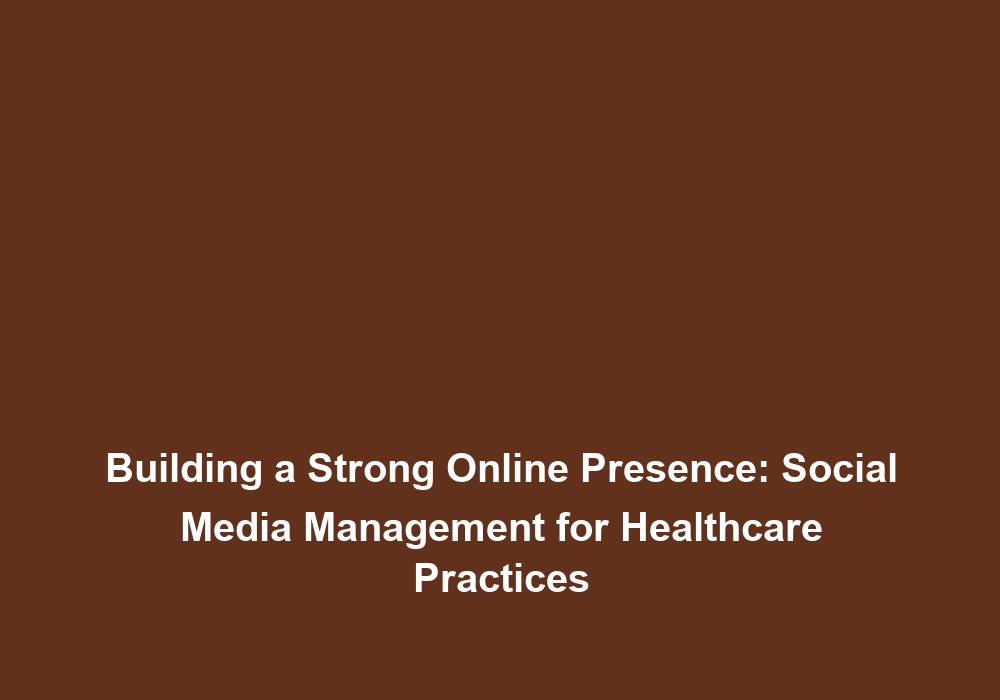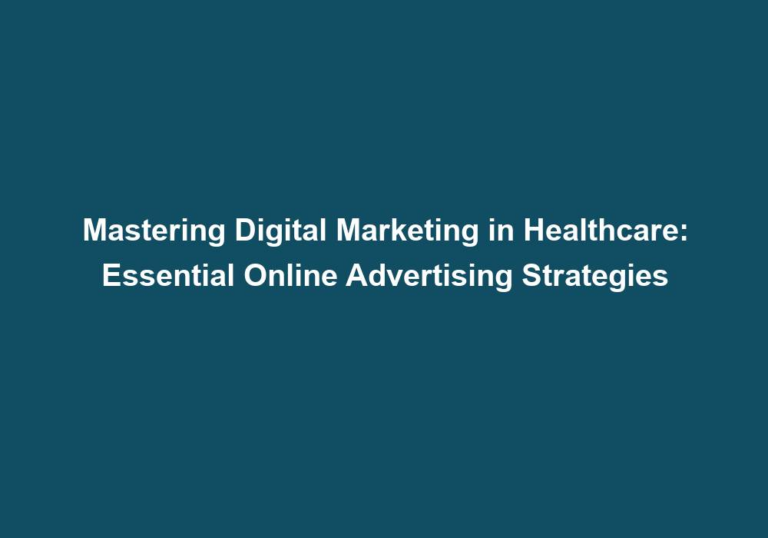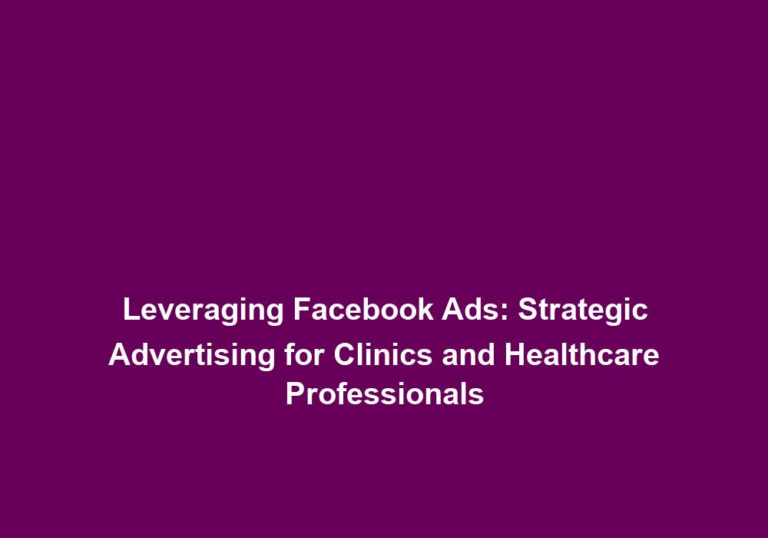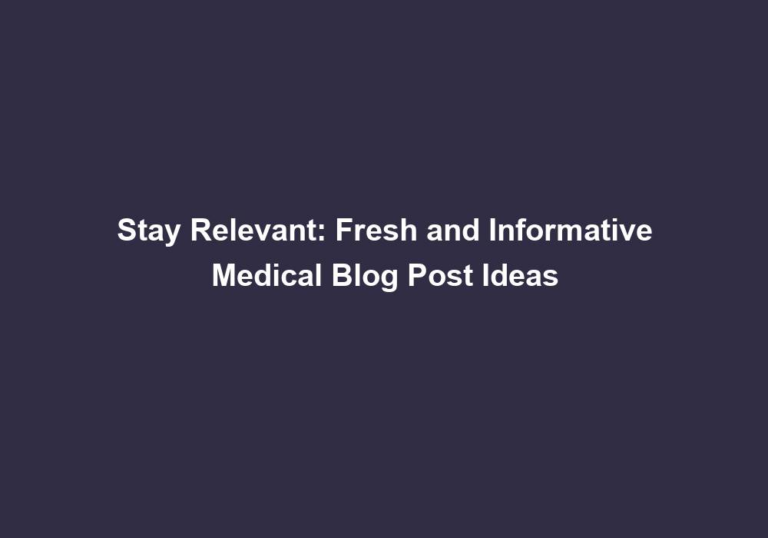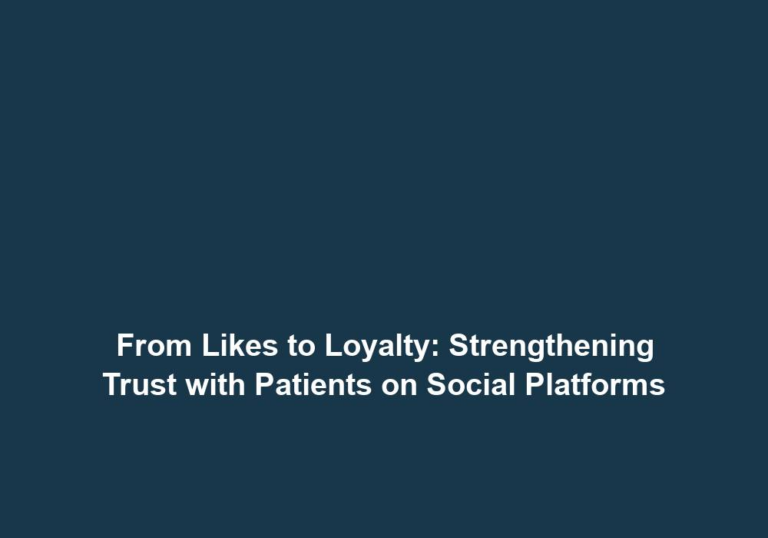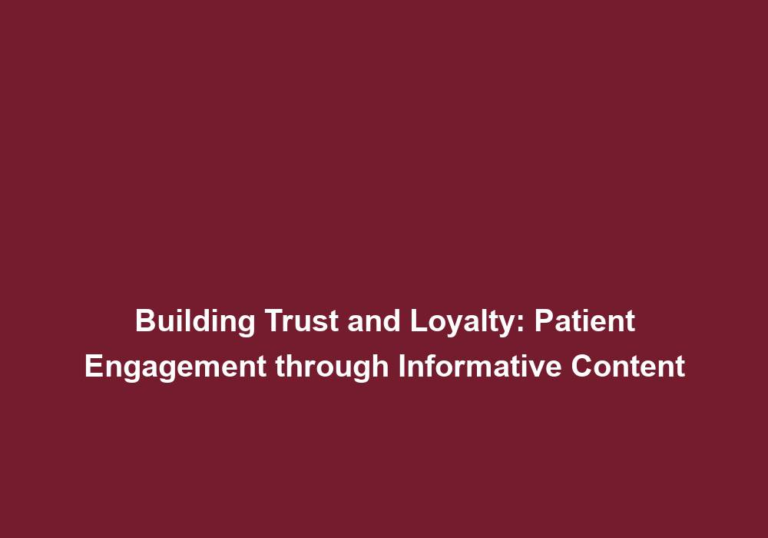Building a Strong Online Presence: Social Media Management for Healthcare Practices
In today’s digital age, having a strong online presence is crucial for healthcare practices. With the increasing use of social media platforms, leveraging these channels can significantly enhance a practice’s visibility, reach, and reputation. Social media management plays a vital role in establishing and maintaining a successful online presence for healthcare providers. In this article, we will explore the key elements and strategies involved in effectively managing social media for healthcare practices.
Why is Social Media Management important for Healthcare Practices?
1. Connecting with Patients
Social media platforms provide an excellent opportunity for healthcare practices to connect with their existing and potential patients. Through frequent and meaningful interactions, practices can build trust, establish themselves as industry experts, and address any concerns or queries patients may have. Consistent communication through social media can foster stronger patient relationships and enhance overall patient satisfaction.
Furthermore, social media allows healthcare practices to humanize their brand and create a sense of community. By sharing personal stories, behind-the-scenes glimpses, and patient success stories, practices can create a more relatable and engaging online presence. This not only helps to build trust but also encourages patients to actively engage with the practice and share their experiences with others.
To effectively connect with patients on social media, healthcare practices can:
- Respond promptly to comments, messages, and inquiries.
- Encourage patients to share their experiences and provide feedback.
- Use a friendly and conversational tone in all interactions.
- Provide valuable and informative content that addresses common healthcare concerns and interests.
2. Increasing Brand Awareness
By actively managing social media platforms, healthcare practices can increase their brand awareness among a wider audience. Sharing valuable content, such as health tips, educational articles, and updates about services or treatments, helps in positioning the practice as a reliable source of information. As patients engage with and share this content, the practice gains exposure to new potential patients, leading to increased brand recognition.
In addition to sharing content, healthcare practices can also utilize social media advertising to expand their reach and target specific demographics. By running targeted ads, practices can ensure that their content is seen by the right audience, further increasing brand awareness and attracting potential patients.
To effectively increase brand awareness on social media, healthcare practices can:
- Consistently share high-quality content that is relevant to their target audience.
- Utilize hashtags and keywords to increase visibility and reach.
- Collaborate with influencers and industry experts to expand their reach and credibility.
- Encourage patients to share their positive experiences and reviews on social media.
3. Enhancing Online Reputation
Social media management allows healthcare practices to proactively monitor and manage their online reputation. By promptly addressing patient reviews, comments, and feedback, practices can demonstrate their commitment to patient care. Positive interactions with patients on social media platforms help build a positive online reputation, which can influence the decision-making process of potential patients.
In addition to addressing patient feedback, healthcare practices can also leverage social media to showcase their expertise and thought leadership. By consistently sharing informative and educational content, practices can position themselves as trusted sources of information within their respective healthcare specialties. This not only enhances the practice’s online reputation but also establishes them as industry leaders and experts.
To effectively enhance online reputation through social media, healthcare practices can:
- Regularly monitor and respond to patient reviews and comments.
- Share success stories and patient testimonials.
- Highlight any awards, certifications, or recognition received by the practice.
- Collaborate with other reputable organizations and professionals in the healthcare industry.
4. Driving Website Traffic
An effective social media management strategy can help drive traffic to a healthcare practice’s website. By promoting valuable content and linking to relevant web pages, practices can encourage patients to explore their website for more information. Increased website traffic not only boosts search engine rankings but also provides an opportunity to convert visitors into patients.
To effectively drive website traffic through social media, healthcare practices can:
- Share blog posts, articles, and other valuable content from their website.
- Utilize eye-catching visuals and compelling headlines to increase click-through rates.
- Include clear and prominent calls-to-action in social media posts.
- Provide easily accessible links to relevant pages on their website.
Key Strategies for Successful Social Media Management
1. Define Goals and Target Audience
Before diving into social media management, it is essential to define clear goals and identify the target audience. Different healthcare practices may have different objectives, such as increasing patient appointments, promoting specific services or specialties, or establishing thought leadership. Understanding the target audience’s demographics, interests, and online behavior helps tailor social media content to resonate with them effectively.
To define goals and target audience effectively, healthcare practices can:
- Conduct market research to identify the needs and preferences of their target audience.
- Set specific, measurable, achievable, relevant, and time-bound (SMART) goals.
- Segment their target audience based on demographics, interests, and healthcare needs.
- Tailor content and messaging to address the unique concerns and interests of different patient segments.
2. Choose the Right Platforms
Social media platforms vary in terms of user demographics and content formats. It is crucial to select the platforms that align with the target audience and the goals of the healthcare practice. For example, Facebook is widely used across age groups and allows for various content formats, making it suitable for most practices. LinkedIn, on the other hand, caters more to professionals and can be an excellent platform for networking and establishing industry authority.
To choose the right platforms for social media management, healthcare practices can:
- Analyze the demographics and user behavior of different social media platforms.
- Consider the content formats and features offered by each platform.
- Research the platforms used by their target audience and competitors.
- Experiment with different platforms and track the performance of each to determine the most effective ones.
3. Develop a Content Strategy
A well-planned content strategy is the foundation of successful social media management. It involves creating and curating relevant, engaging, and shareable content that resonates with the target audience. Content can include educational articles, infographics, videos, patient testimonials, and updates about the practice. Consistency in posting and maintaining a content calendar ensures that the practice remains active and visible on social media platforms.
To develop an effective content strategy, healthcare practices can:
- Conduct keyword research to identify popular topics and search terms within their specialty.
- Create a content calendar to plan and organize content creation and publishing.
- Use a mix of different content formats to cater to different audience preferences.
- Monitor industry trends and news to stay relevant and provide timely information.
4. Engage with the Community
Engagement is key to building a strong online presence. Responding promptly to patient inquiries, comments, and messages demonstrates the practice’s commitment to patient care. Encouraging dialogue, asking questions, and seeking patient feedback fosters a sense of community and strengthens patient relationships. Engaging with other industry professionals and influencers can also help expand the practice’s reach and authority.
To effectively engage with the community on social media, healthcare practices can:
- Set aside dedicated time each day to respond to comments and messages.
- Encourage patients to share their experiences, ask questions, and provide feedback.
- Participate in relevant healthcare-related discussions and hashtags.
- Collaborate with influencers and thought leaders to amplify their reach and credibility.
5. Monitor and Analyze Performance
Regularly monitoring social media performance provides valuable insights into what works and what needs improvement. Utilizing analytics tools provided by social media platforms or third-party applications can help track metrics such as reach, engagement, click-through rates, and conversions. This data can guide future content decisions, optimize strategies, and measure the effectiveness of social media efforts.
To effectively monitor and analyze social media performance, healthcare practices can:
- Set up social media tracking and analytics tools to collect relevant data.
- Monitor key performance indicators (KPIs) such as reach, engagement, and conversions.
- Identify trends and patterns in performance data to make informed decisions.
- Experiment with different content formats, posting times, and strategies to improve performance.
Conclusion
In a world driven by digital interactions, healthcare practices must prioritize social media management to build a strong online presence. By connecting with patients, increasing brand awareness, enhancing online reputation, and driving website traffic, social media platforms offer numerous benefits for healthcare providers. Effective strategies, such as defining goals, choosing the right platforms, developing a content strategy, engaging with the community, and monitoring performance, contribute to successful social media management. By embracing these strategies, healthcare practices can establish themselves as trusted industry leaders and attract and retain a loyal patient base.

